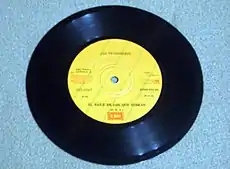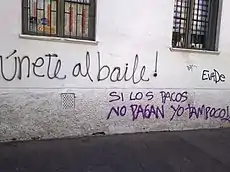El baile de los que sobran
"El baile de los que sobran" (The dance of those left over) is a single from the album Pateando piedras by the Chilean rock/pop band Los Prisioneros. It was considered by National Library of Chile as one of the most emblematic of Chilean popular music of the 80s.[1]
| "El baile de los que sobran" | ||||
|---|---|---|---|---|
 | ||||
| Single by Los Prisioneros | ||||
| from the album Pateando piedras | ||||
| B-side | "Por favor" | |||
| Released | 1986 | |||
| Genre | ||||
| Label | EMI | |||
| Songwriter(s) | Jorge González | |||
| Los Prisioneros singles chronology | ||||
| ||||


Composition and recording
"El baile de los que sobran" composed and written by Jorge González, presents strong social criticism regarding "young people marginalized after leaving formal education".[4] Memoria Chilena wrote that lyrics "bitterly and hopelessly illustrates the class differences that exist among Chilean youth. Long before the problem of poor income distribution was incorporated into the public debate in Chile, Los Prisioneros described in a painfully accurate way what it was like to spend twelve years in a numbered high school and then graduate to unemployment".[1]
González assured in some interviews that the dog from which the barking sounds sampled at the beginning of the song were extracted was called "Néstor", who was his mother's pet.[5] For the song, Jorge used a drum machine lent to him by Miguel Conejeros from the Pinochet Boys and was heavily influenced by Heaven 17 and Depeche Mode. At first he had no guitar and the tempo was slower, later he decided to record it again to speed up the tempo, introduce the sampled barking sound and ask Claudio Narea to play acoustic guitar. The band manager, Carlos Fonseca was responsible for its release as a single in 1986.[1]
Use in politics
"El baile de los que sobran", and other songs by Los Prisioneros became a symbol of the struggle against the repression of the military dictatorship and "its vindictive message crossed ages and social segments". As the 1988 plebiscite approached, their music began to be affected by censorship, hardened after the group publicly declared their adherence to the "No" option.[1]
Use in protests
The song also became one of the anthems of the protests held in Chile during 2019,[6][7] being sung in marches and used in banners and graffiti.[8][9] Regarding the use of the song, Jorge González said that "it is very sad that people are still singing it. That song was created under the same conditions in which it was sung: with a curfew and bullets."[10]
It also ranked first among the most listened to Chilean songs on Spotify.[11] After the victory of the "Apruebo" option in the 2020 Chilean national plebiscite, the song was also sung by supporters of said option in celebration.[12][13]
References
- "El baile de los que sobran". Memoria Chilena. Retrieved 9 February 2021.
- Zuñiga, Fabio Salas (1998). El grito del amor: una actualizada historia temática del rock (in Spanish). Lom Ediciones. p. 188. ISBN 978-956-282-156-8. Retrieved 6 October 2022.
- Nierenberg, Jacob (17 May 2022). "100 Of The Best 90s Alternative Songs: When The Underground Went Mainstream". uDiscover Music. Retrieved 8 October 2022.
- "Los Prisioneros". Música Popular (in Spanish). Archived from the original on 15 May 2007. Retrieved 6 October 2022.
- "La historia del perro que ladra en "El baile de los que sobran"". Es Hoy (in Spanish). 17 November 2019. Retrieved 6 October 2022.
- ""El baile de los que sobran", la mítica canción de Los Prisioneros que se convirtió en el himno de "la marcha más grande de Chile"". BBC News Mundo (in Spanish). 26 October 2019. Retrieved 8 October 2022.
- PERÚ, NOTICIAS EL COMERCIO (26 October 2020). ""El baile de los que sobran": la historia de la canción de Los prisioneros que Chile canta tras el plebiscito". El Comercio (in Spanish). Retrieved 4 February 2021.
- Garrido, Mónica (2020-10-18). "Canto universal: las canciones que sonaron fuerte en el estallido social chileno" [Universal song: The songs that sounded loud in the Chilean social outburst]. La Tercera. Archived from the original on 2020-10-26. Retrieved 2020-10-26.
- Gamarra Dueñas, Ayrton (2019-10-30). ""El Baile De Los Que Sobran": un himno para América Latina" ["El Baile De Los Que Sobran": an anthem for Latin America]. Garaje del Rock (in Spanish). Archived from the original on 2020-11-12. Retrieved 2020-11-12.
- "Jorge González y "El baile de los que sobran": Es triste que se siga cantando" [Jorge González and "El baile de los que sobran": It' sad that it's still being sung]. Cooperativa (in Spanish). Archived from the original on 2019-10-29. Retrieved 2020-10-26.
- Digital, Equipo de Crónica. "Cómo nació "El Baile de los que Sobran": el himno de la Revolución Ciudadana en Chile". Crónica Digital (in Spanish). Archived from the original on 26 November 2020. Retrieved 19 February 2021.
- "[VIDEO] Quillotanos salieron a la plaza a celebrar el triunfo del "Apruebo"" [[VIDEO] People from Quillote went out to the plaza in order to celebrate the triumph of the "Approve"]. Diario El Observador (in Spanish). Archived from the original on 2020-11-12. Retrieved 2020-11-12.
- Chernin, Andrew (2020-10-26). "La fiesta y la furia de Baquedano: Los festejos en la zona cero" [The party and fury of Baquedano: The partying in the zero zone]. La Tercera. Archived from the original on 2020-11-01. Retrieved 2020-11-12.